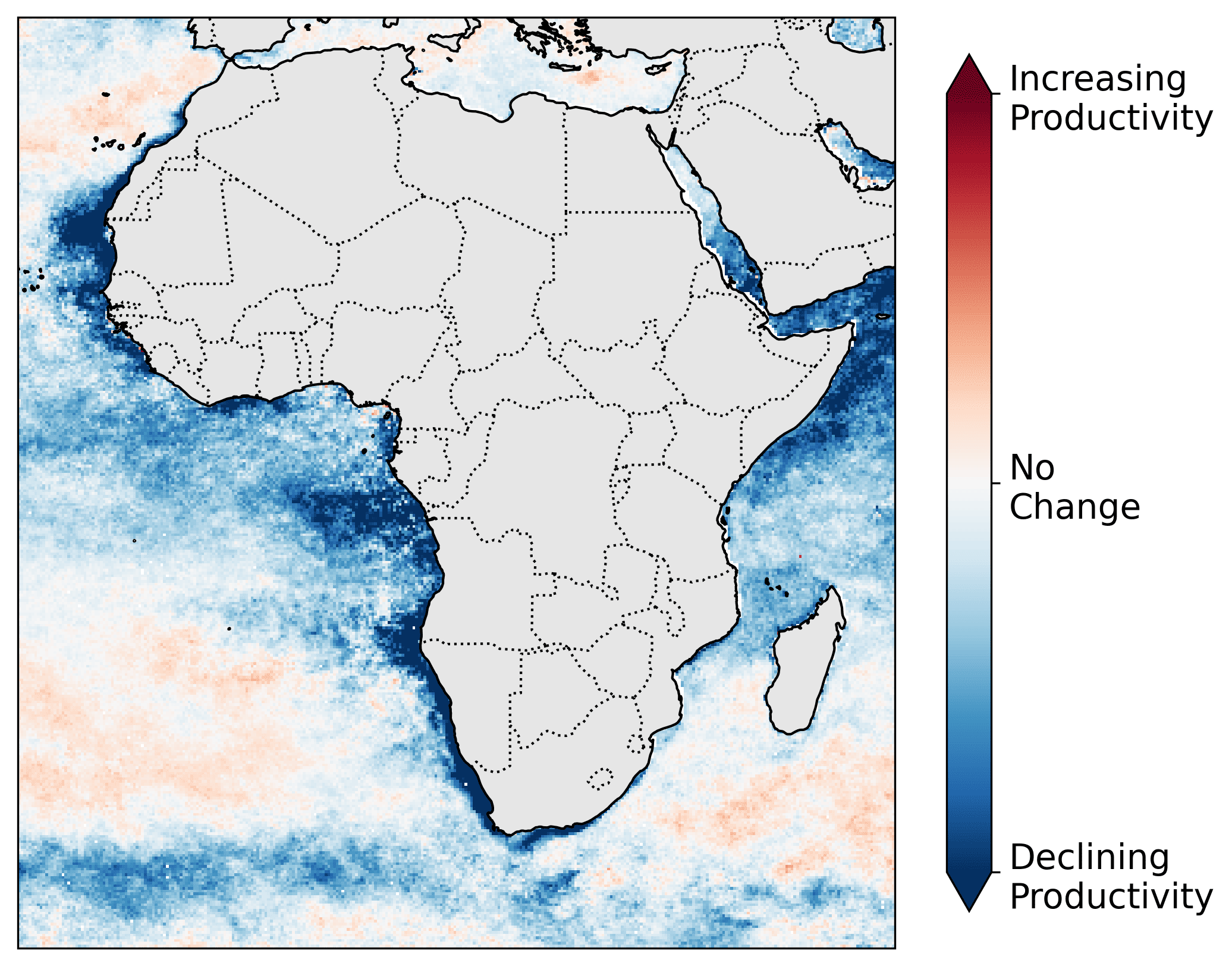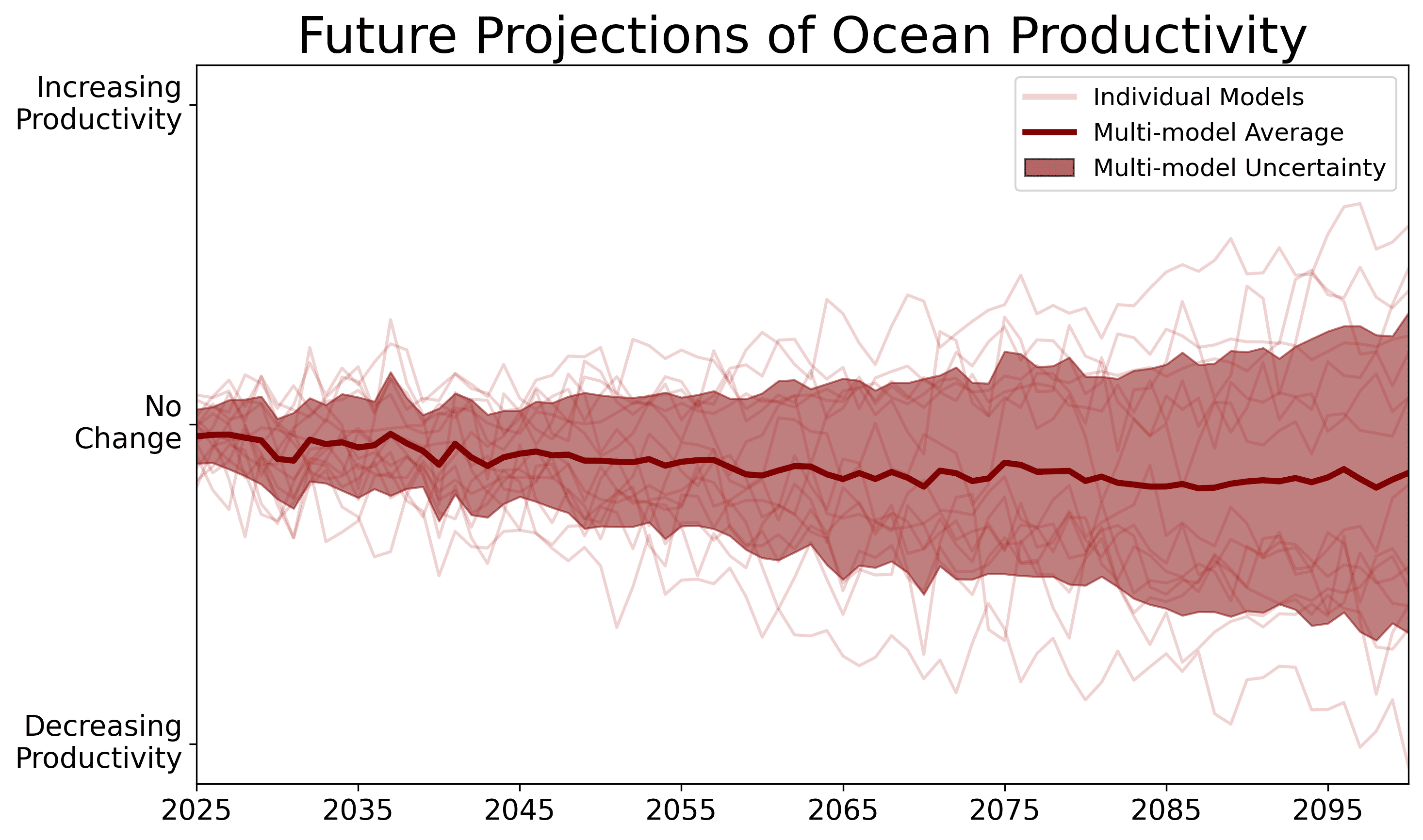Global decline in ocean production underestimated by climate models, CSIR-led research finds
Ocean productivity is one of the most critical processes on the planet because it helps to regulate global climate and supports essential ecosystem services (such as fisheries). Phytoplankton are microscopic plants that live in the sunlit surface of the waters of the ocean and drive the ocean productivity. However, despite the importance of phytoplankton, scientists do not have a clear understanding of how climate change can impact them. Some climate models suggest that ocean productivity will increase in the future, whilst others suggest that it will decline.
CSIR researchers say that climate models underestimate the global decline in the productivity of the oceans resulting from ocean warming. Their finding follows an analysis of 26 years of remote sensing data and comparing these contemporary trends to future projections from a wide range of climate models. Their study was published in Nature’s scientific journal Communications Earth & Environment on 1 February 2025.
CSIR principal researcher Dr Tommy Ryan-Keogh led the study along with CSIR chief researcher Dr Sandy Thomalla, in collaboration with Professor Alessandro Tagliabue from the University of Liverpool.
Ocean productivity is one of the most critical processes on the planet because it helps to regulate global climate and supports essential ecosystem services (such as fisheries). Phytoplankton are microscopic plants that live in the sunlit surface of the waters of the ocean and drive the ocean productivity. However, despite the importance of phytoplankton, scientists do not have a clear understanding of how climate change can impact them. Some climate models suggest that ocean productivity will increase in the future, whilst others suggest that it will decline. To begin to address this disagreement and subsequent uncertainty between model projections of ocean productivity, the researchers published a study entitled “Global Declines in Net Primary Production Underestimated by Climate Models.”
In this study the researchers used a novel approach combining ocean productivity estimates from 26 years of satellite data, from 1998 to 2023, and projected end-of-century trends from available earth system models to assess the climate impacts on marine ecosystems.
“This is one of the first studies to use data from the past 26 years to assess how ocean productivity may be changing and to link these current changes to the future state of our oceans,” says Ryan-Keogh. To predict the anticipated changes, the researchers developed a model ranking scheme that assessed how well each model can represent the relationships between productivity and different environmental drivers. The models which best represented these relationships and are ranked highest all predict future declines in ocean productivity. Nonetheless, the future projections of even the best ranked models are underestimated and much smaller than the changes that researchers are observing now.
“We believe that even the best-ranking models are underestimating the sensitivity of declines in productivity to ocean warming,” says Ryan-Keogh.
The researchers argue that the next generation of climate models will need to correct this sensitivity to represent the ongoing changes in ocean productivity accurately. This means that these models will project even greater declines, even under high-mitigation scenarios that currently predict relatively stable ocean productivity at the end of the century.
“It is important to note, however,” says Thomalla, “that ocean productivity is not declining everywhere. The ocean is patchy, and there are some areas where productivity is increasing, but when we average it across the global ocean, it is decreasing. If we zoom in on the African coastline, for example, we can see large declining trends in ocean productivity inshore, relative to the smaller increasing trends seen in open ocean waters further offshore.” (see Figure 1).
The role of phytoplankton in the sustainability of our planet is receiving increasing attention, with the “The Plankton Manifesto” launched in 2024. Phytoplankton are under threat, and this manifesto calls for immediate global recognition and an action plan to protect these vital organisms. The Plankton Manifesto is the result of a collaborative effort led by the United Nations Global Compact that involved 30 international experts from leading institutions and industries worldwide. It will seek endorsements at key global environmental conferences, including COP29 on Climate Change, COP16 on Biodiversity, and the United Nations Ocean Conference in Nice, France, in June 2025.
“This study is a call to attention. Our climate models are currently underestimating the future change in ocean productivity. These global declines will have ramifications for the ocean carbon cycle and marine ecosystems, affecting the trophic system that underpins biodiversity, fisheries and the marine resources on which humans rely,” expresses Thomalla.
The researchers say that the lack of consensus on the direction and magnitude of the projected change in ocean productivity from the models undermines efforts to assess climate impacts on marine ecosystems with confidence. It may suggest that a new research area of exploration be pursued collectively.


-ENDS-
Issued by CSIR Strategic Communication
For more information contact:
Kulani Chauke, CSIR Media Relations Manager
Tel: 012 841 2314
Mobile: 071 266 0019
Email: kchauke@csir.co.za
About the CSIR
The CSIR, an entity of the Ministry of Higher Education, Science and Innovation, is one of the leading scientific and technology research, development and implementation organisations in Africa. Constituted by an Act of Parliament in 1945 as a science council, the CSIR undertakes directed and multidisciplinary research and technological innovation, as well as industrial and scientific development, to improve the quality of life of all South Africans. For more information, visit www.csir.co.za
Follow us on social media:
X (Twitter): @CSIR. Facebook: CSIRSouthAfrica. Instagram: CSIRSouthAfrica. LinkedIn: Council for Scientific and Industrial Research (CSIR). YouTube: CSIRNewMedia

